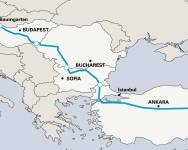Many observers expected late-2010 to be the moment of truth for what the European Union calls its "Southern Corridor": a gas-transit route to Southern and Southeastern Europe regarded as a political priority by the EU and some Central and Eastern European countries, eager to reduce their dependence on Russian gas in their energy-supply mix. Since at least 2007, there has been fierce competition between two rival pipeline projects seeking to transport gas supplies from the Caspian basin and grab market shares in these profitable downstream outlets: Nabucco, backed by the EU and the United States; and South Stream, a joint venture between Gazprom and Italy's ENI, with France's EDF expected to become a partner by the end of the year.
With the moment of truth now upon us, however, the picture for both projects looks quite different than what was anticipated. Nabucco, in spite of significant political support and international financial backing, still fails to fulfill the most-important condition for the feasibility of a pipeline -- namely, access to sufficient reserves of gas to transport. For its part, South Stream is not faring much better. Heavily pushed by sectors of the Russian political establishment, it appears increasingly questionable from an economic standpoint. South Stream's planned seabed pipeline under the Black Sea would be very costly, and its capacity of 63 billion cubic meters (bcm) -- necessary to benefit from economies of scale and offset its huge fixed construction cost -- seems too large given the steep fall in Europe's gas-demand outlook. Repeated attempts to bring a German company into the consortium -- the names of RWE and Wintershall have been floated in recent months -- signal the poor shape of the venture. To make matters worse, disagreements that have emerged on several occasions between founding partners Gazprom and ENI have done nothing to help the project's smooth development.
While the competition between the two pipelines is often referred to as a geopolitical contest, this characterization misses an important point: The obstacles these projects face are not strictly political in nature. Both Nabucco and South Stream have received governmental approval from all parties involved.

